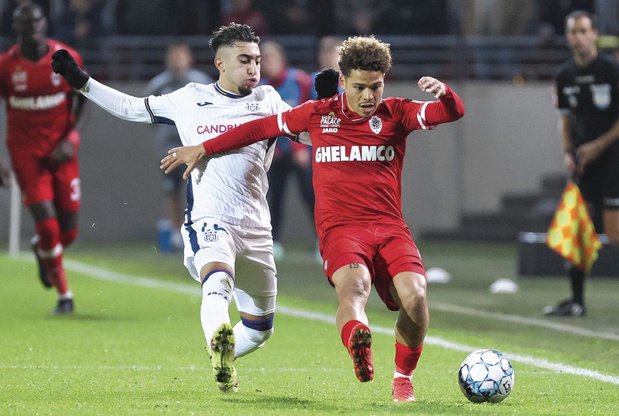His talent has never been in doubt, but his effectiveness has not followed suit. Manuel Benson, on the other hand, has already scored five goals and provided four assists for the number 1 this season and seems to be on a roll.
Eric Van Meir had a young Manuel Benson under his wing at Lierse. “Benson had a lot of talent from a young age and this is now being fully expressed at a top club. In fact, he always worked hard for it, only in his mind he might not always have agreed with the staff,” he told Het Laatste Nieuws.
But that’s not all. “My criticism of Benson at the time was that he didn’t add enough variation to his game. Then he was always coming in from the right on his left foot. He has worked on that. Now “Benny” varies more, for example he crosses more with his right foot or he moves a little bit. Also, he is no longer cooked after sixty minutes.”
A frenetic dribbler addicted to short hooks, Benson Manuel has also long been a talent thwarted by a less linear career path than hoped. Meet a fragile genius.
Apart from the change of coaches, the environment around Antwerp has changed a lot this summer with the departure of Lucien D’Onofrio and his entourage. Does that change anything in the daily life of the club ?
BENSON MANUEL : Yes, of course. I have the impression that the club has become more friendly. When I arrived at Antwerp for my first season, in the summer of 2019, the club was really different. Now everything is easier, people are more relaxed. It’s probably also linked to the fact that we have a younger, more accessible group, I would say. When you arrive at a club at the age of 22 and your coach is called Laszlo Bölöni, your sporting director is Lucien D’Onofrio and your team-mates Kevin Mirallas, Steven Defour, Lior Refaelov, Sinan Bolat and Dieumerci Mbokani, it’s inevitably a bit intimidating. It’s even more so if you’re going through a complicated period like I was at the time. In fact, I didn’t feel like I had anyone to talk to in that group because I didn’t feel like I had the right to be down. All these guys make you feel like you never have any doubts. Maybe that’s normal, they’re at the end of their career, they have hundreds of professional matches behind them, they’re above all that. That wasn’t the case for me. Two and a half years later, it’s already a bit different. First of all because in the meantime the club has called in a mental coach. But also, and probably because I would handle this situation better today than I did at the time, when I had a rather bad experience of it.

It was in the Mouscron rescue operation, during the 2018-2019 season, that you had your best role. Was it a trigger to see that you could also be important in D1 and in a dressing room where there was a lot of talent ?
MANUEL : When I arrived there, the club was last and had lost its first five games. I expected to have a very difficult season and then Bernd Storck arrived and everything changed. There I found my sensations again. I was playing, I was having fun, I was doing my thing, I was trusted. It was like at Lierse, I could sometimes allow myself to be a little less good, but that didn’t necessarily call everything into question. It was important for me to find a coach who had faith in my qualities. It also allowed me to find the mental balance I had lost in Genk. But yes, what was good for me was to succeed in reproducing in D1A what I had done well in D1B.
“I felt that it wasn’t right, that I didn’t have the same click with Genk as before”
What made it not click with Felice Mazzù when you returned to Genk the following summer ?
MANUEL : As soon as I returned to Genk, I immediately felt this weight on my shoulders. As if the problem hadn’t been completely solved yet. But I’d had a good preparation there too. We had won the Supercup and I was in the starting line-up for the first match of the season. And then Mazzù had told me that there would be a three-way competition for the wingers’ positions with Theo Bongonda, Junya Ito and me. This suited me well, I thought it was fair, even if I knew I was starting a little late. But very quickly, I felt that things weren’t right, that I didn’t have the same “click” with the club. Something was broken. And as I had contacts with several clubs, including Antwerp, I followed my feeling.
During your time at Genk, you were in contact with Dante Vanzeir in the Limburg dressing room. Are you surprised by his progress over the last four years ?
MANUEL : No, because unlike me, Dante has always been very strict with himself. He has always done everything that was asked of him. He even puts his shirt inside his shorts, that’s to say ( He laughs). Honestly, he’s a guy, you can tell him no ten times, remove him from the group five times in a row, put him in the stands four times, you’ll never hear him. He’s a hard worker, but above all, he’s very calm, very serene. Wherever he goes, he puts his goals in. At first, people aren’t very fond of him, but he doesn’t take offence and he always manages to put himself forward. This guy must be a model for all young people in football.








